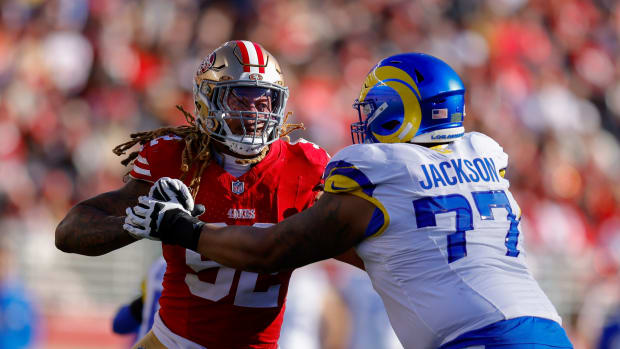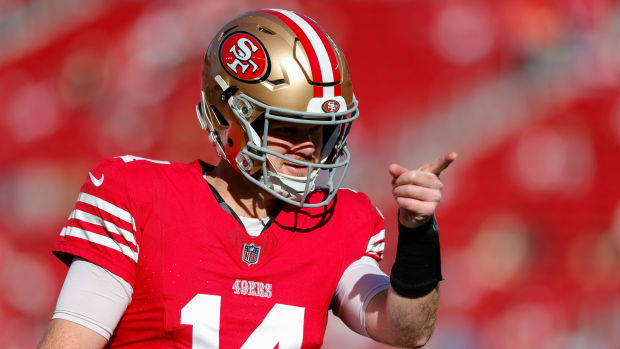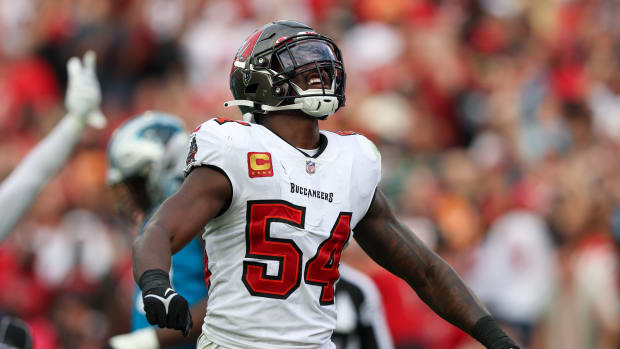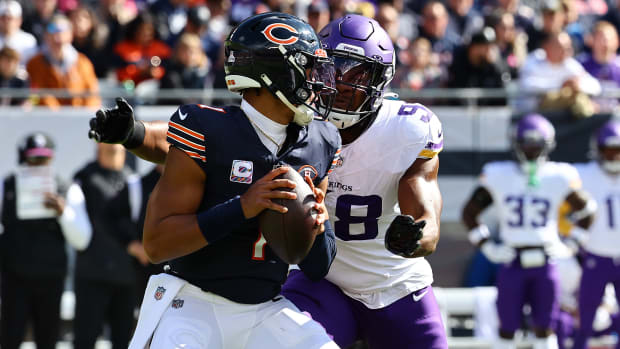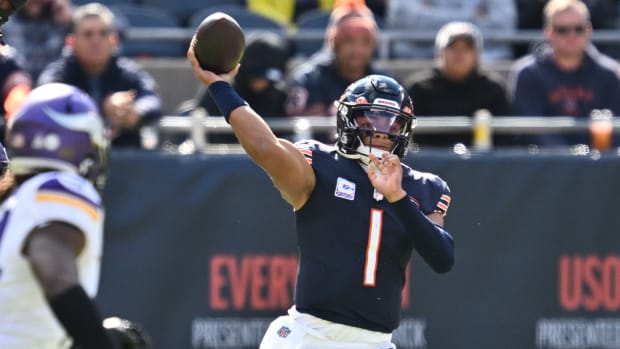
Last-second Leos Strike Again
My favorite scene of the weekend, though, came at a tense time in Minneapolis, and is a huge reason why the Lions passed Green Bay and moved to within a half-game of the slumping Vikings in the NFC North on Sunday. And there’s a very good chance you have no idea it even happened.
Two seconds. Jim Caldwell got two seconds added to the clock in the game’s 58th minute, and two seconds turned out to be an eternity for Detroit. Two seconds gave the Lions life at the end of the fourth quarter.
TV didn’t catch it. Nobody caught it. The key people in the game didn’t know about it, not even three-and-a-half hours after it was over.
“I had no idea,” Detroit wide receiver Andre Roberts, who made a game-prolonging 27-yard catch in the final seconds of the fourth quarter, said when the team arrived back in Michigan on Sunday night. “I wasn’t aware of that.”
The story of the amazing and ridiculous Detroit Lions season grows in legend weekly. The Lions are 5-4. In each of the five wins, Detroit trailed in the last 90 seconds. Truly, the Lions could be 0-9 right now. It’d be a heartbreaking 0-9, but it’d be an explainable 0-9.
They beat Minnesota because of a play offensive coordinator Jim Bob Cooter just installed last week, because Matthew Stafford likes playing when it is darkest, because Roberts executed a perfect in-cut at the perfect depth, because Matt Prater kicked a 58-yard field goal at the end of the fourth quarter, because Golden Tate has balance rivaling Simone Biles, and because Jim Caldwell made the kind of coaching decision and the kind of convincing argument with referee Ed Hochuli’s crew that affected the outcome of the game.
Start with Caldwell. Detroit led 13-9 with 1:17 left in the fourth. Minnesota had the ball at the Lions’ 11. Fourth and four. Detroit had one timeout left. If the Vikings converted but didn’t score on this play, Caldwell knew they had to burn the last timeout and hope that if the Vikings scored, they’d do so with enough time left that Stafford would have a play or two to get the Lions in long Prater range for the tie.
Stefon Diggs caught a pass from Sam Bradford and went down at the Detroit three-yard line with 1:14 left. Detroit called for a timeout. The clock stopped with 1:11 left. On the Lions sideline, they knew they should have a second or two, at least, added. Caldwell called for a conference. Officials blew their whistles, and Caldwell made his case. He was right, they determined. On TV, a few seconds before the next play was run, you heard the muffled sound asking for the timekeeper to add time to the game clock, and on the screen, in the little score box, the “1:11” changed to “1:13.”
It took the Vikings three plays to get in for the go-ahead touchdown, and the drive included a dubiously called Minnesota timeout with 27 seconds left, which ended up aiding Detroit tremendously. Trailing 16-13, Stafford took the ball at the Lions’ 25. After an eight-yard sideline pass to Tate, 17 seconds remained. The clock was stopped. And it was time to run Cooter’s new play.
“Most end-of-game defenses don’t let you get out of bounds,” Roberts said. “They’ll play their guys near the sidelines so you can’t out of bounds. So we had this play where our guys run in-cuts and get down right away. Then we run to the line and try to spike it so we can run another play or kick the field goal.”
Cooter’s theory was that the in-cuts, run by four receivers, would be open—at least one of them anyway—with the defenders cheating toward the sidelines. Before the huddle broke, Stafford said to his receivers: “Catch it! Get down! Then get back to the line!”
Roberts, starting from the right flank, was supposed to run 25 yards downfield. “I went 27,” he said. Then he pivoted left.
With 13 seconds left, Stafford threw a line drive.
With 11 seconds left, a sliding Roberts caught the pass at the Minnesota 40.
With 10 seconds left, Minnesota linebacker Emmanuel Lamur flopped onto Roberts, preventing him from getting up. “Just doing his job,” Roberts said. “That’s what defenders are supposed to do. We know it. We work on that a lot.”
With eight seconds left, Roberts wrestled free of Lamur and got up and ran to line up—anywhere. He ended up in the backfield.
With six seconds left, sprinting to the line with his linemen, Stafford made the clocking motion.
With three seconds left, the Lions, after sprinting 30 yards and getting set, motionless, so they wouldn’t get a game-ending flag for not being set at the snap of the ball, were 11 statues at the Minnesota 40.
With two seconds left, Stafford clocked the ball.
Deep breaths.
As the clock hit :00, Prater’s kick was long and high and straight down the middle, like an old Tiger Woods drive on a straight par 5.
Tie game.
When I told Roberts about the Caldwell timeout and the successful plea for two seconds, he said, “Hey, luckily we got those two seconds. If we didn’t, who knows? Maybe we run a different play at the end. I don’t know.”
Overtime. Deflated crowd. Lions won the toss. In six minutes, Stafford drove from his 13 to the Vikings’ 28. Tate lined up flanked left, by the numbers. Across from him: Xavier Rhodes, Minnesota’s best cover corner. Lurking nearby: Harrison Smith, one of the best safeties in football, to double Tate if Stafford chose him. Surely Stafford would look elsewhere. Right?

Golden Tate was able to shed the attempted tackle by Harrison Smith and would go on to find the end zone.
Adam Bettcher/Getty Images
“That specific play,” said Tate, “I ran my route and just tried to get some space. Matthew threw a dart. He made some great throws today. That was one of them.”
Tate ran a simple out-route, to the Vikings’ 15. When he caught the ball, his feet were maybe eight inches from the white stripe of the sideline. Here came Rhodes, shoulder lowered. How did he miss? No idea. He was anticipating that Tate would lunge forward, but Tate stayed at the 15, readying himself for the hit from Smith, approaching on his blind side, from behind.
“Smith’s a great, phenomenal player,” Tate of his former Notre Dame teammate. “God took over. God pushed me off Harrison, and somehow I stayed in.”
Smith grabbed Tate with both arms around the 14. Tate, somehow, stopped his momentum with a man hanging on him, got free of Smith around the 10, ran toward the end zone, and pirouetted through the air in joy, diving into the end zone.
The 58-yard field goal and the long gain and the clocking just in time and then Tate staying in bounds. Week after week, it’s something with this team. If one thing goes wrong … just one thing …
“If its and buts were pots and pans, the whole world would be a kitchen,” Tate said.
Never heard that one before. Pretty good.
“We got incredible heart,” Tate continued. “We truly don’t believe it’s over ’tll there’s two zeroes on the clock. I don’t know how it happened. I don’t know how I stayed in. But we got an incredible quarterback, incredible athletes on the perimeter, and we don’t give up. This group, we love the game.”
So we see.
































